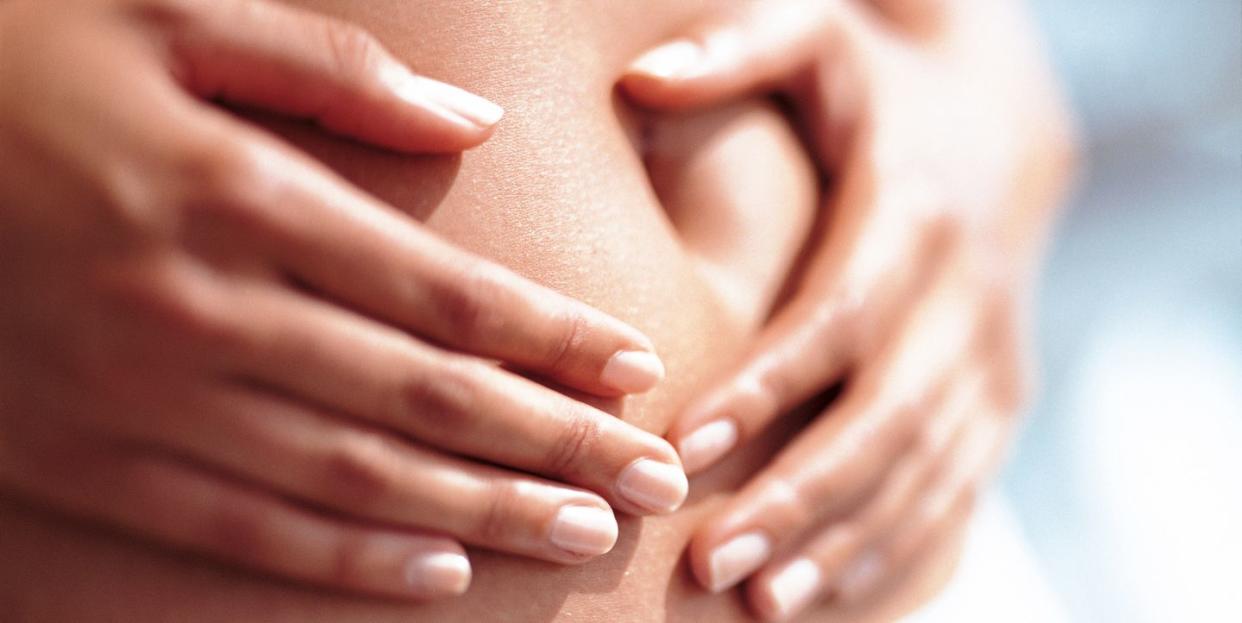Why period pain might be a sign of early pregnancy

If you experience abdominal cramps in the lead up to your period, menstruation might not be to blame - particularly if you're trying for a baby. Instead, the culprit could be implantation cramps, which can be an early sign of pregnancy. But what exactly are implantation cramps, and how can you tell the difference between cramping and period pains?
We spoke to consultant gynaecologist and obstetrician Dr Karen Morton about the symptoms of implantation cramps, how long the discomfort typically lasts for and telltale signs you might be pregnant:
What are implantation cramps?
Implantation cramps are the pain sometimes experienced when a fertilised egg attaches itself to the lining of the uterus, though every woman is different and some won't feel it at all. Implantation cramping usually lasts for 1-3 days. If you do not usually experience cramps in the week or two leading up to your period, then you may be pregnant.
'The fertilised egg reaches the inside of the uterus when it is just a bundle of cells,' explains Dr Morton, 'and it badly needs to grip on to the juicy endometrium to get some nourishment and start the miraculous process of placentation. It needs to burrow into the lining and start to grow little tentacles of early placenta, called trophoblast.'
This process may lead to a little bleeding and a cramp-like feeling, similar to the pain experienced when anticipating a period. 'Millions of women will have walked around with a tampon in their bag thinking their period was imminent because of the discomfort,' says Dr Morton.
⚠️ If you experience particularly painful cramps, Dr Morton recommends taking paracetamol to ease the discomfort.
Implantation cramp symptoms
The signs that you might be experiencing implantation as opposed to menstruation cramps are ones that are also symptoms of pregnancy.
'There may be other tell-tale signs that this is early pregnancy which may give the game away,' says Dr Morton. 'Breast tenderness may be much worse than usual and often women start to need to pass urine more often; perhaps at night. These will usually precede any feeling of nausea or tiredness.'
Other early pregnancy symptoms include:
A missed period - the most obvious sign
Mood swings and unexpected emotional changes
Abdominal bloating
Sensitivity to certain foods
Nausea and sickness
Bowel changes such as constipation
Implantation cramp or period pain?
The cramp-like pain could be down to menstruation rather than pregnancy, so if you are hoping to be pregnant and you're not sure, try not to get your hopes up until you've taken a positive pregnancy test. 'It is a very fine line between implantation and menstruation cramps, such that really it is only what comes next which distinguishes the two.'
If your period doesn't arrive on time, then take a pregnancy test. If your period does follow, then you can be sure the cramping was due to menstruation rather than early pregnancy.
'Pregnancy tests are very sensitive these days so they become positive really as soon as the period is due,' says Dr Morton. 'Equally you don’t want to spend a fortune on tests so give it until your period is 5 days late. '
If you want to confirm a positive urine pregnancy test, talk to your GP about having a blood test. This measures levels of the hormone hCG and this can show a positive result (rising hormone level) as soon as a week after conception.
When to see a doctor about cramping
Usually, cramping is nothing to worry about. However, if the pain is severe, one sided or lasts for more than several days, or if you experience significant vaginal bleeding then you should speak to your GP.
'The only situation when pain during implantation is a worry is if it is due to implantation occurring in the Fallopian tube,' says Dr Morton.
'If a woman has had an ectopic pregnancy before or damage to her tubes due to infection, she should be alert to this risk and see a doctor if in significant pain or bleeding goes on for more than a few days.'
Last updated: 21-06-2021
You Might Also Like


